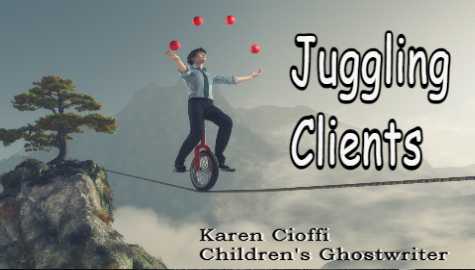As a children’s ghostwriter, I usually work on multiple children’s book projects daily. This usually includes weekends.
I also have a family and help with my grandchildren. So, my plate is FULL.
This means I do a lot of juggling.
Working with multiple clients simultaneously can be tricky.
The key to juggling clients is to be organized, focused… and flexible.
Here are three strategies I find helpful in keeping it all together.
ORGANIZATION
As a former accountant, I’m very organized and meticulous.
When a client queries me, I immediately create a Word Client File and put it in a Potential Client folder.
Every email that’s sent or phone conversation, along with my responses, goes in the file.
In addition, I also have a Potential Client spreadsheet. I put the date, the client’s name, and email address. I include what the query is about and the amount I quoted. I also add other information such as whether it’s a series.
Why is keeping accurate records vital?
I’ve had a couple of potential clients who’ve gotten back to me after one or two years. They finally decided to move forward, or life had gotten in the way, and the path became clear. Whatever the reason for the delay, I have our initial communications.
Then, once a client decides to use my services, I have a freelance agreement that details the process, the payment schedule, and incidentals.
It’s essential to have everything spelled out so there’s no miscommunication or confusion. Transparency matters.
It’s also important to have information at your fingertips whenever you need it.
Another part of organization is scheduling.
Up until about a year or so ago, I could take clients on as they came. Then, the workload became too heavy.
I currently schedule two weeks to one month out.
But no matter how organized you are, you don’t have control of the clients.
I’ve had clients who would take a week, two weeks, or more to get back to me. This is a problem.
As I write the story, I send portions of it to the client to review so the client can ensure their vision is there. I need to wait for their feedback before I can proceed.
Delays throw a monkey wrench in my scheduling and workload.
If I have a client scheduled to start on a particular day and a client I’m currently working with takes a lot of time to respond, the current project cuts into my scheduled work.
I end up juggling more clients than I should have to.
I now have a clause in the agreement that there will be a charge for a response delay of more than 10 days, including weekends.
FOCUS
Next up is focus.
When you’re working on multiple storylines at the same time, you must have focus. It’s true for all writing, but it’s especially true when dealing with multiple storylines.
I work on two or three projects in one day to keep all the stories moving along. Sometimes more, if I have a lot of clients at once.
This means I have to quickly switch gears and focus on an entirely different story, and then do it again… and again every day until the story is complete and approved.
Working with therapists, psychologists, and even doctors, I have to be on the mark. And I give every client the same attention.
Then, I may get an email from a client whose story I’m not working on that day. I have to switch to yet another gear.
If I couldn’t focus on what I was doing at the moment, I’d never be able to handle multiple clients.
FLEXIBILITY
Flexibility goes hand in hand with focus.
As you may need to drop one story and focus on another, then pick up where you left off and move forward, you must be flexible.
The Cambridge Dictionary defines flexible as being able to “change or be changed easily according to the situation” and being “able to bend without breaking.”
I can be in the middle of writing a children’s chapter book or middle grade and need to adjust my thinking to work on a picture book. This has to be done without losing a beat and without getting overwhelmed.
Keep in mind that each genre in the children’s arena is different. Words, situations, ages, sentence lengths, and so on are different. You must be flexible to write in multiple genres on the same day.
So, these are three of the most important elements needed to be a successful children’s ghostwriter.
If you’re considering diving into ghostwriting children’s books, keep in mind that you’ll need organization skills, focus, and flexibility to make it work.

I’m a working children’s ghostwriter, rewriter, editor, and coach. I can help turn your story into a book you’ll be proud to be the author of, one that’s publishable and marketable.
OTHER HELP I OFFER:
HOW TO WRITE A CHILDREN'S FICTION BOOK
A DIY book to help you write your own children’s book.
FICTION WRITING FOR CHILDREN eCOURSE
4, 8, or 12 Weeks / 8 Sections / Instructor Guided Self-Study Program
WRITERS ON THE MOVE SELF-PUBLISHING SERVICE
Self-publishing help for children’s authors.
Creating An Author Online Platform
Step-by-step with a former WOW! Women on Writing author online platform instructor
You can contact me at: kcioffiventrice@gmail.com.

10 Hot Tips for Writing a Good Children’s Story
5 Top Tips to Boost Your Writing Skills
Your Children’s Fiction Manuscript and a Ghostwriter

